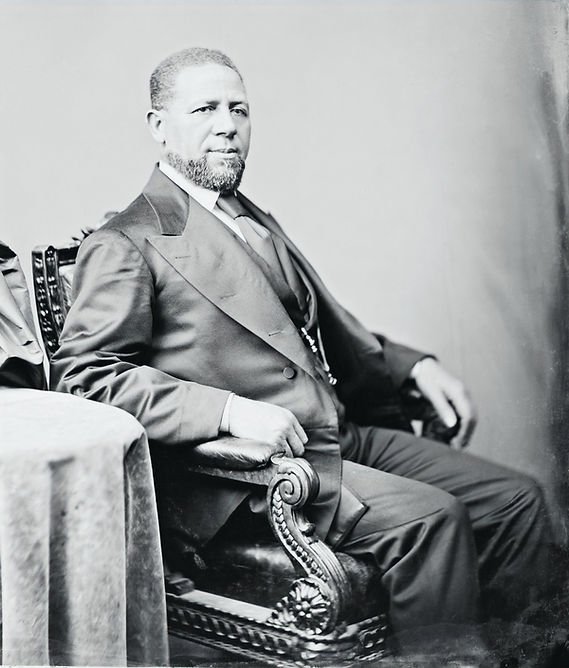



Hiram Rhodes Revels
Hiram R. Revels, had a heritage that was both unique and diverse. His father worked as a Baptist preacher, and his mother was of Scottish descent. He claimed his ancestors “as far back as {his} knowledge extends, were free.” In addition to his Scottish background, he was rumored to be of mixed African and Croatian Indian lineage, which reflected the intricate tapestry of his cultural background. This heritage not only informed his personal identity but also made him a symbol of the rich diversity that has always existed in America.
Hiram Rhodes Revels was born to free parents in Fayetteville, North Carolina, on September 27, 1827. Although he grew up In an era when educating Black children was illegal in North Carolina, Revels was able to attend a school taught by a free Black woman. He worked for a few years as a barber, and inherited his brother's shop when he passed away. In 1844, he moved North to complete his education. Revels attended the Beech Grove Quaker Seminary in Liberty, Indiana, and the Darke County Seminary for black students, in Ohio. In 1845, Revels was ordained in the African Methodist Episcopal (AME) Church. His first pastorate was likely in Richmond, Indiana, where he was elected an elder to the AME Indiana Conference in 1849. In the early 1850s, Revels married Phoebe A. Bass, a free black woman from Ohio, and they had six daughters.
Revels traveled throughout the country to Illinois, Kansas, Louisiana, Mississippi, Missouri, Ohio, and Tennessee, preaching and teaching African Americans. Although Missouri prohibited by law the education of Black people, free or enslaved, Revels moved to St. Louis in 1853 to serve as pastor of an AME Church. Despite his cautiousness, Revels was briefly imprisoned for preaching to the Black community. In 1854, he accepted a position with the Presbyterian Church in Baltimore, Maryland. He also worked as the principal of a Black school in Baltimore and attended Knox College in Galesburg, Illinois, from 1855 to 1857.
When the Civil War broke out, Revels helped recruit two black regiments in Maryland and even led one. After the war, his work in education and significant leadership skills led him into politics.




In January 1870, Revels presented the opening prayer in the state legislature. That prayer made Revels a United States Senator. Fellow Mississippi legislator, John R. Lynch, later wrote. ”He made a profound impression upon all who heard him. It impressed those who heard it that Revels was not only a man of great natural ability but that he was also a man of superior attainments." His prayer was so eloquent and inspirational, and his list of accomplishments so impressive, that—at that very meeting—he was nominated and elected to the U.S. Senate by a vote of 81 to 15.
Hiram Rhodes Revels became the first African American to serve in the U.S. Congress in 1870 - representing Mississippi. Revels filled a vacant seat in the United States Senate, previously held by Jefferson Davis. Revels' presence in the Senate was a powerful symbol of progress during a time of post-Civil War aggression and racial tensions. He advocated for civil rights and education for African Americans, symbolizing the hopes of newly freed men and women striving for a more equitable and just society. His brief but impactful tenure in the Senate marked a significant step forward in the post-Civil War Reconstruction efforts. After his tenure as U.S. Senator, Revels became president of Alcorn College (now called Alcorn State University), the first land grant college for black students.
Hiram R. Revels' legacy extends beyond his political career. He continued his work as a minister and educator, founding schools and promoting religious and social upliftment within the African-American community. Revels' historic election and his dedication to civil rights and education paved the way for future generations of African-American leaders in American politics and society, leaving an enduring mark on the struggle for racial equality in the United States.
In honoring and memorializing Hiram R. Revels, we pay tribute not only to his personal accomplishments but also to the broader struggle for racial equality. He stood as a beacon of hope for marginalized communities, demonstrating that barriers could be broken, and change was possible even during challenging times. Revels' legacy serves as a reminder of the importance of diversity and inclusion in the American story and inspires continued efforts toward a more just and equal society for all.